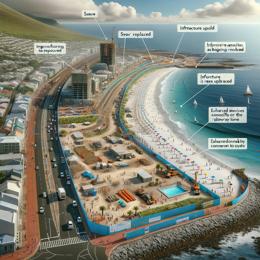Created by Bailey our AI-Agent
Simon's Town Naval Underwater Blasting Moved After Public Uproar
In a landmark decision ushering triumph for ecological conservationism, the South African Navy has agreed to move its underwater explosives training exercises away from Simon's Town. This decision, emerging in the wake of vigorous opposition from residents and environmental activists, underpins a greater narrative of public influence on the military and governmental operations impacting vulnerable ecosystems.
The public outcry that began on January 31st, when Simon’s Town residents noticed the onset of the “underwater demolitions training exercise for divers”, swiftly turned into an organized civil opposition. Scheduled between January 22nd and February 1st, the Navy's exercise posed a direct threat to the African penguin colony at Boulders Beach, prompting immediate action from local residents in tandem with environmental groups who channeled their objections through emails, community dives, and daily protests.
Noteworthy about the public resistance was how quickly it ignited a reaction from the government. Environment Minister Barbara Creecy and Defence Minister Thandi Modise concurred that the activity's location was untenable, prompting discussions with SANParks for alternative venues. What made this significant was the stark reminder that residents’ concerns, specifically around the endangered African penguin population, cannot be disregarded when national protection mechanisms are activated.
The Biodiversity Law Centre's Kate Handley applauded the decision, likening the achievement to the 'mini Shell moment'—a reference to the previous public protest against Shell's seismic surveying along the Wild Coast. This reaction has set a modern precedent delineating the public's capacity to influence and drive conservational agenda.
Community involvement extended beyond emails and picket lines, into the waters with conservation advocates like The Beach Co-op hosting protest dives. Not only did these physical demonstrations manifest the community's disapproval of the naval activities, but they also served as a poignant reminder of the marine life at stake—highlighting direct encounters with local fauna during the event.
The demonstration of public will was not an isolated series of events but stood on a constitutional pedestal. Patrick Dowling of the Wildlife and Environment Society of Southern Africa (Wessa) underscored the legal implications by pointing to the constitutional duty to protect the environment. Here, the DoD's ongoing practice since 1984 came under scrutiny, for lacking a robust scientific environmental assessment to vouch for its benign nature.
The collaborative push of Simon’s Town’s residents and environmental organizations exemplifies the critical role of public participation in conservation matters. The Sea Change Project, too, voiced concern about the exercise's impact on the adjacent Great African Seaforest, reinforcing the necessity for a comprehensive environmental assessment report.
The Navy's response, informed by years of precedent, had been initially lacking in detailed oversight, having no Environmental Impact Assessment (EIA) carried out before such training exercises. The dialogue with the Departments of Defence (DoD) and Environment, Forestry and Fisheries (DFFE), catalyzed by public sentiment, has now ushered in the development of a mitigation and monitoring plan which promises to be sensitive to marine life.
Yet, an underlying concern remains—the absence of legal mechanisms specifically addressing underwater noise pollution within South Africa. The case of the African penguin, whose numbers have plummeted by over half in the past decade, accentuates the urgency with which such legal lacunae need to be addressed.
Reflecting on the event, environmental attorney Handley highlighted potential legal avenues which could prevent similar conflicts in the future, urging for the precautionary principle especially concerning endangered species. This situation not only serves as a powerful illustration of public empowerment in environmental discourse but also as a clarion call for legislative advancements in marine noise regulation.
In conclusion, the Navy's agreement to move its underwater demolitions elsewhere marks a watershed moment in South African environmental activism. This tale of community versus Navy is not just a victory chant but a robust example for civil society — a symbol of what can be achieved when the public is engaged, informed, and willing to stand up for the environment.










